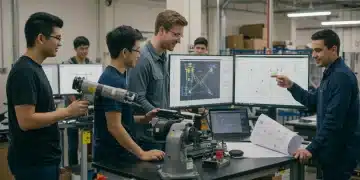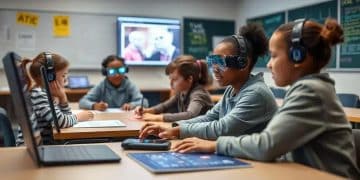Discover how new education programs are shaping future job markets

Education programs are evolving to meet future job market needs by integrating technology, fostering industry partnerships, and focusing on essential skills like critical thinking and communication.
Discover how new education programs are shaping future job markets. As industries evolve, so too must the ways we prepare students for future careers. Have you thought about how these programs impact your own career path?
The evolution of education programs
The evolution of education programs is a fascinating journey that reflects changing societal needs. Over the years, these programs have transformed to prepare students for a rapidly changing world. Understanding this evolution helps us appreciate the role education plays in career readiness.
The shift from traditional methods
In the past, education often relied on rote memorization and standardized testing. This approach no longer suits the diverse needs of today’s learners. Modern education programs emphasize skills like critical thinking, problem-solving, and collaboration.
Key elements of modern education programs
- Adaptability to technology: Integrating digital tools to enhance learning experiences.
- Focus on soft skills: Teaching communication, teamwork, and emotional intelligence.
- Real-world application: Providing hands-on learning opportunities through internships or projects.
As we embrace new models, one thing is clear: education must evolve continuously to stay relevant. The rise of online and hybrid learning programs showcases this shift. These formats offer flexibility, allowing students to learn at their own pace and on their own schedules.
Schools now partner with industries to ensure curriculum aligns with workforce requirements. This collaboration produces graduates who possess skills directly applicable to future jobs. Furthermore, many education programs have adopted competency-based education. It allows students to advance upon mastering skills rather than being confined to traditional grading timelines.
In summary, the evolution of education programs demonstrates a clear shift towards preparing learners for real-world challenges. As we look to the future, ongoing adaptation will play a crucial role in shaping successful educational strategies.
Key skills needed for future jobs

In today’s job market, understanding the key skills needed for future jobs is essential. As technology evolves and industries change, specific skills have become vital for success. These skills not only prepare individuals for job opportunities but also help them to adapt to workplace challenges.
Critical thinking and problem-solving
Employers are increasingly looking for individuals who can analyze situations, think critically, and solve complex problems. The ability to approach challenges analytically is invaluable. Problem-solving skills not only help in handling daily tasks but also in long-term project success.
Technical proficiency
Being tech-savvy is no longer optional; it is a necessity. Basic understanding of software tools, data analysis, and programming languages can set candidates apart. Many industries are shifting towards technology-driven solutions, making this skill highly desirable.
- Data analysis: Interpreting data to make informed decisions.
- Digital marketing: Understanding online platforms for brand visibility.
- Software development: Basic coding skills for project management.
Interpersonal skills are equally important. Effective communication and teamwork are essential in today’s collaborative work environments. Being able to relay ideas clearly and work well with others enhances productivity and promotes a positive work culture. Adaptability stands out as another key skill. The ability to adjust to shifting circumstances and learn new skills quickly is crucial in this dynamic job landscape.
Finally, innovation and creativity play a vital role. Companies value individuals who can bring fresh ideas and innovative solutions to the table. Encouraging creative thinking not only helps in problem-solving but also in developing new products and services. As we move forward, mastering these key skills will prepare individuals for the jobs of tomorrow.
How education programs adapt to market needs
Education programs are continually evolving to meet the changing demands of the workforce. Understanding how education programs adapt to market needs is essential for preparing students for their future careers. This adaptation ensures that educational institutions remain relevant and produce graduates with the necessary skills.
Industry partnerships
One key method of adaptation is through partnerships with various industries. Educational institutions work closely with companies to understand their needs and adjust curricula accordingly. This collaboration allows schools to provide training that closely aligns with job market requirements.
Incorporation of technology
Another significant way education programs adapt is by integrating the latest technology into learning environments. With the rise of remote work and digital tools, educational institutions are focusing on developing digital literacy and technical skills. This approach helps students gain valuable experience that employers seek.
- Online courses: Offering flexible options for diverse learning styles.
- Virtual simulations: Providing hands-on experiences in a controlled environment.
- Tech labs: Equipping students with the tools to learn and practice technical skills.
Furthermore, education programs are increasingly focusing on soft skills, such as communication and teamwork. These skills are essential for success in any workplace. By incorporating group projects and collaborative assignments, students learn to interact effectively and build strong working relationships.
In summary, education programs are not static; they continually adjust to meet the evolving needs of the job market. With a focus on both technical and interpersonal skills, students are better equipped to navigate their future careers. As industries change, education must also innovate to ensure graduates are prepared for the challenges that lie ahead.
Case studies of successful programs

Exploring case studies of successful programs provides valuable insights into what makes educational initiatives effective. These examples showcase innovative approaches that have positively impacted students and prepared them for future careers.
Program A: Tech Integration in Schools
One remarkable example is a program that integrates technology into the classroom. By providing students with access to coding and digital tools, this program enhances their learning experience. Students engage in hands-on projects that teach them about software development and data management.
Program B: Industry Partnerships
Another success story is an initiative where schools partner with local industries. This collaboration offers students real-life experiences through internships and mentorships. Participants gain invaluable skills and network connections, making them more competitive in the job market.
- Internship opportunities with local companies.
- Workshops led by industry professionals.
- Real-world projects that solve community issues.
Additionally, programs focusing on soft skills development have shown great success. They equip students with essential skills like teamwork, communication, and problem-solving. These skills are often overlooked, yet they are critical for success in any career.
As education evolves, learning from these successful case studies can guide future initiatives. By adopting best practices and innovative methods, educational programs can continually improve and better serve their students’ needs.
FAQ – Frequently Asked Questions about Education Programs and Future Job Markets
How do education programs adapt to market needs?
Education programs collaborate with industries to adjust curricula and ensure students learn the skills that employers are seeking.
What key skills are necessary for future jobs?
Skills like critical thinking, technical proficiency, and soft skills such as communication are essential for success in the evolving job market.
Can technology within education improve learning outcomes?
Yes, integrating technology in education provides students with hands-on experience that enhances their learning and prepares them for tech-driven workplaces.
What are some successful examples of education programs?
Successful programs often include industry partnerships, technology integration, and focus on developing both hard and soft skills to prepare students for future challenges.





